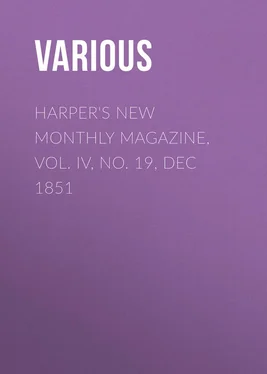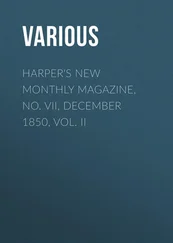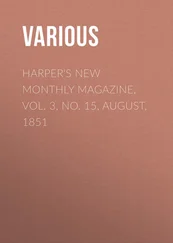Various - Harper's New Monthly Magazine, Vol. IV, No. 19, Dec 1851
Здесь есть возможность читать онлайн «Various - Harper's New Monthly Magazine, Vol. IV, No. 19, Dec 1851» — ознакомительный отрывок электронной книги совершенно бесплатно, а после прочтения отрывка купить полную версию. В некоторых случаях можно слушать аудио, скачать через торрент в формате fb2 и присутствует краткое содержание. Издательство: Иностранный паблик, Жанр: periodic, foreign_edu, на английском языке. Описание произведения, (предисловие) а так же отзывы посетителей доступны на портале библиотеки ЛибКат.
- Название:Harper's New Monthly Magazine, Vol. IV, No. 19, Dec 1851
- Автор:
- Издательство:Иностранный паблик
- Жанр:
- Год:неизвестен
- ISBN:нет данных
- Рейтинг книги:5 / 5. Голосов: 1
-
Избранное:Добавить в избранное
- Отзывы:
-
Ваша оценка:
- 100
- 1
- 2
- 3
- 4
- 5
Harper's New Monthly Magazine, Vol. IV, No. 19, Dec 1851: краткое содержание, описание и аннотация
Предлагаем к чтению аннотацию, описание, краткое содержание или предисловие (зависит от того, что написал сам автор книги «Harper's New Monthly Magazine, Vol. IV, No. 19, Dec 1851»). Если вы не нашли необходимую информацию о книге — напишите в комментариях, мы постараемся отыскать её.
Harper's New Monthly Magazine, Vol. IV, No. 19, Dec 1851 — читать онлайн ознакомительный отрывок
Ниже представлен текст книги, разбитый по страницам. Система сохранения места последней прочитанной страницы, позволяет с удобством читать онлайн бесплатно книгу «Harper's New Monthly Magazine, Vol. IV, No. 19, Dec 1851», без необходимости каждый раз заново искать на чём Вы остановились. Поставьте закладку, и сможете в любой момент перейти на страницу, на которой закончили чтение.
Интервал:
Закладка:
Every thing relating to the tea movement was now in the hands of the Boston Committee of Correspondence. A large volunteer guard was enrolled, and every necessary preparation was made to support the resistance resolutions of the 29th. A fortnight elapsed without any special public occurrence, when, on the afternoon of the 13th of December, intelligence went through the town that the Eleanor , Captain James Bruce, and the Beaver , Captain Hezekiah Coffin, ships of the East India Company, laden with tea, had entered the harbor. They were moored at Griffin's wharf by the volunteer guard, and that night there were many sleepless eyes in Boston. The Sons of Liberty convened at an early hour in the evening, and expresses were sent to the neighboring towns with the intelligence. Early the next morning the following placard appeared:
" Friends! Brethren! Countrymen! – The perfidious arts of your restless enemies to render ineffectual the resolutions of the body of the people, demand your assembling at the Old South Meeting House precisely at two o'clock this day, at which time the bells will ring."
The "Old South" was crowded at the appointed hour, yet perfect order prevailed. It was resolved to order Mr. Roch to apply immediately for a clearance for his ship, and send her to sea. The owner was in a dilemma, for the governor had taken measures, since the arrival of the Dartmouth, to prevent her sailing out of the harbor. Admiral Montague, who happened to be in Boston, was directed to fit out two armed vessels, and station them at the entrance to the harbor, to act in concert with Colonel Leslie, the commander of the garrison at the Castle. Leslie had already received written orders from the governor not to allow any vessel to pass the guns of the fort, outward, without a permit, signed by himself. Of course Mr. Roch could do nothing.
As no effort had yet been made to land the tea, the meeting adjourned, to assemble again on the 16th, at the same place. These several popular assemblies attracted great attention in the other colonies; and from New York and Philadelphia in particular, letters, expressive of the strongest sympathy and encouragement, were received by the Committee of Correspondence. At the appointed hour on the 16th, the "Old South" was again crowded, and the streets near were filled with a multitude, eager to participate in the proceedings. They had flocked in from the neighboring towns by hundreds. So great a gathering of people had never before occurred in Boston. Samuel Phillips Savage, of Weston, was chosen Moderator, or Chairman, and around him sat many men who, two years afterward, were the recognized leaders of the Revolution in Massachusetts. When the preliminary business was closed, and the meeting was about to appoint committees for more vigorous action than had hitherto been directed, the youthful Josiah Quincy arose, and with words almost of prophecy, uttered with impassioned cadence, he harangued the multitude. "It is not, Mr. Moderator," he said, "the spirit that vapors within these walls that must stand us in stead. The exertions of this day will call forth events which will make a very different spirit necessary for our salvation. Whoever supposes that shouts and hosannas will terminate the trials of this day, entertains a childish fancy. We must be grossly ignorant of the importance and the value of the prize for which we contend: we must be equally ignorant of the power of those who have combined against us; we must be blind to that malice, inveteracy, and insatiable revenge, which actuates our enemies, public and private, abroad and in our bosoms, to hope that we shall end this controversy without the sharpest conflicts – to flatter ourselves that popular resolves, popular harangues, popular acclamations, and popular vapor will vanquish our foes. Let us consider the issue. Let us look to the end. Let us weigh and consider before we advance to those measures which must bring on the most trying and terrible struggle this country ever saw." This gifted young patriot did not live to see the struggle he so confidently anticipated; for, when blood was flowing, in the first conflicts at Lexington and Concord, eighteen month's afterward, he was dying with consumption, on ship-board, almost within sight of his native land.
The people, in the "Old South," were greatly agitated when Quincy closed his harangue. It was between three and four o'clock in the afternoon. The question was immediately proposed to the meeting, "Will you abide by your former resolutions with respect to not suffering the tea to be landed?" The vast assembly within, as with one voice, replied affirmatively, and when the purport was known without, the multitude there responded in accordance. The meeting now awaited the return of Mr. Roch, who had been to the governor to request a permit for his vessel to leave the harbor. Hutchinson, alarmed at the stormy aspect of affairs, had taken counsel of his fears, and withdrawn from the city to his country-house at Milton, a few miles from Boston. It was sunset when Roch returned and informed the meeting that the governor refused to grant a permit, until a clearance should be exhibited. As a clearance had already been refused by the collector of the port, until the cargo should be landed, it was evident that government officers had concerted to resist the demands of the people. Like a sea lashed by a storm, that meeting swayed with excitement, and eagerly demanded from the leaders some indication for immediate action. Night was fast approaching, and as the twilight deepened, a call was made for candles. At that moment, a person in the gallery, disguised in the garb of a Mohawk Indian, gave a war-whoop, which was answered from without. That signal, like the notes of a trumpet before the battle-charge, fired the assemblage, and as another voice in the gallery shouted, "Boston harbor a tea-pot to-night! Hurrah for Griffin's wharf!" a motion to adjourn was carried, and the multitude rushed to the street. "To Griffin's wharf! to Griffin's wharf!" again shouted several voices, while a dozen men, disguised as Indians, were seen speeding over Fort Hill, in that direction. The populace followed, and in a few minutes the scene of excitement was transferred from the "Old South" to the water side.
No doubt the vigilant patriots had arranged this movement, in anticipation of the refusal of the governor to allow the Dartmouth to depart; for concert of action marked all the operations at the wharf. The number of persons disguised as Indians, was fifteen or twenty, and these, with others who joined them, appeared to recognize Lendall Pitts, a mechanic of Boston, as their leader. Under his directions, about sixty persons boarded the three tea-ships, brought the chests upon deck, broke them open, and cast their contents into the water. The Dartmouth was boarded first; the Eleanor and Beaver were next entered; and within the space of two hours, the contents of three hundred and forty-two chests of tea were cast into the waters of the harbor. During the occurrence very little excitement was manifested among the multitude upon the wharf; and as soon as the work of destruction was completed, the active party marched in perfect order back into the town, preceded by a drum and fife, dispersed to their homes, and Boston, untarnished by actual mob or riot, was never more tranquil than on that bright and frosty December night.
A British squadron was not more than a quarter of a mile from Griffin's wharf, where this event occurred, and British troops were near, yet the whole proceeding was uninterrupted. The newspapers of the day doubtless gave the correct interpretation to this apathy. Something far more serious had been anticipated, if an attempt should be made to land the tea; and the owners of the vessels, as well as the public authorities, civil and military, doubtless thanked the rioters , in their secret thoughts, for thus extricating them from a serious dilemma. They would doubtless have been worsted in an attempt forcibly to land the tea; now, the vessels were saved from destruction; no blood was spilt; the courage of the civil and military officers remained unimpeached; the " national honor " was not compromised, and the Bostonians, having carried their resolutions into effect, were satisfied. The East India Company alone, which was the actual loser, had cause for complaint.
Читать дальшеИнтервал:
Закладка:
Похожие книги на «Harper's New Monthly Magazine, Vol. IV, No. 19, Dec 1851»
Представляем Вашему вниманию похожие книги на «Harper's New Monthly Magazine, Vol. IV, No. 19, Dec 1851» списком для выбора. Мы отобрали схожую по названию и смыслу литературу в надежде предоставить читателям больше вариантов отыскать новые, интересные, ещё непрочитанные произведения.
Обсуждение, отзывы о книге «Harper's New Monthly Magazine, Vol. IV, No. 19, Dec 1851» и просто собственные мнения читателей. Оставьте ваши комментарии, напишите, что Вы думаете о произведении, его смысле или главных героях. Укажите что конкретно понравилось, а что нет, и почему Вы так считаете.












